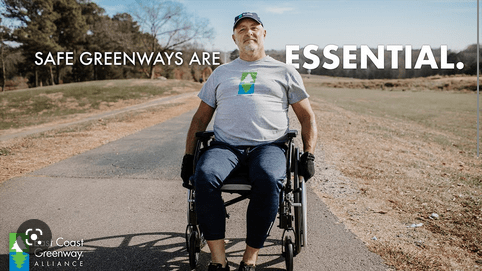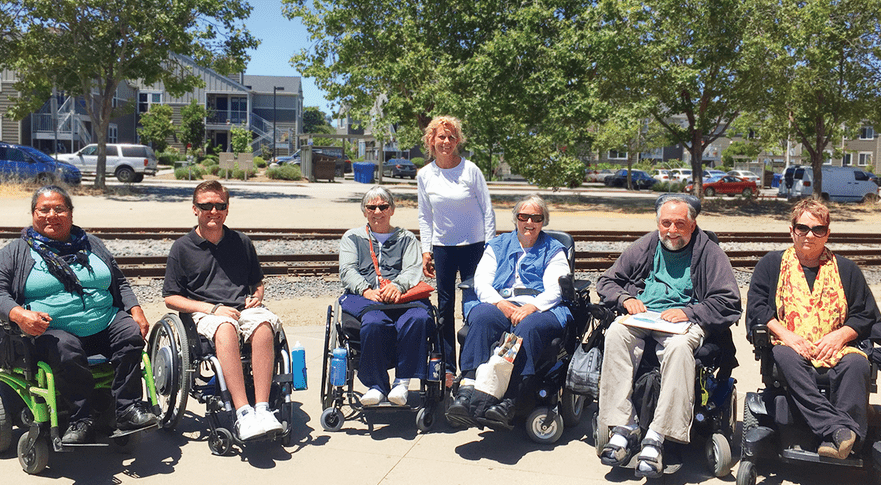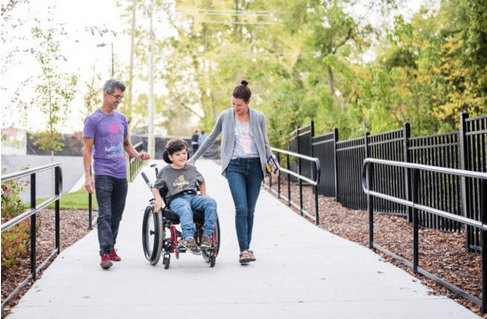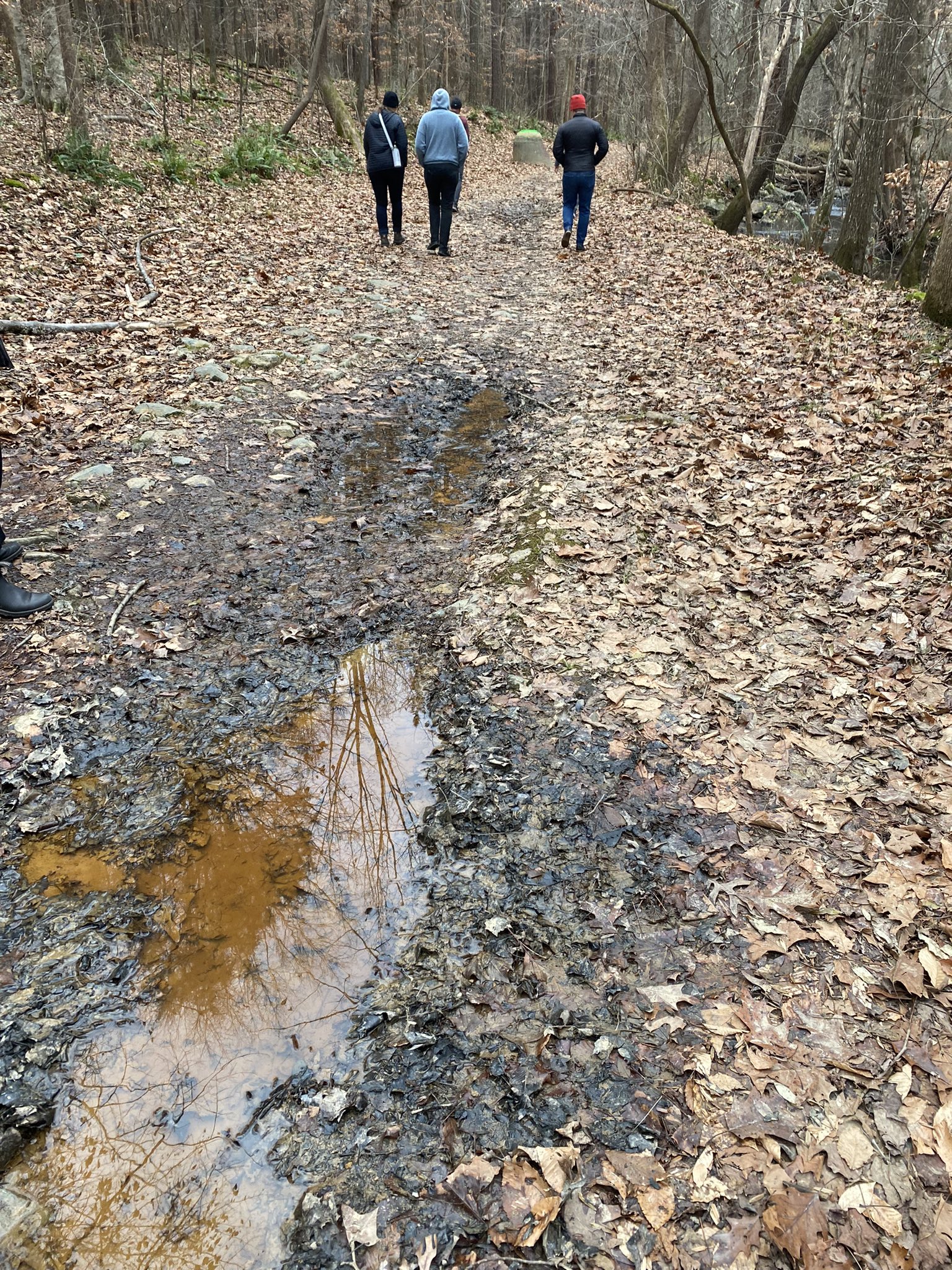The freelance writer Margaret Kingsbury wrote an essay last year in which she talked about existing barriers to accessing greenways in her community. Those barriers — unpaved walkways, paths without wheelchair accessibility — make it difficult for people with disabilities to walk or roll along urban greenways.

Currently, people who use wheelchairs and strollers and walkers can easily access greenways in Chapel Hill, Hillsborough, Durham, Raleigh, Charlotte and Cary — but they can’t do so along Bolin Creek in Carrboro.
But Carrboro is now discussing whether to add a paved 10-foot-wide trail alongside the 30-foot-wide sewer easement along Bolin Creek — which would extend to the paved Bolin Creek Trail in Chapel Hill. There are many reasons to do this — creating a path for people to go on, instead of having them walk all over the place, can help repair the riparian zone along the creek, and the path will also provide a safe way for kids and adults to get to school and work — but for me, one of the most important reasons is this: It will provide five miles of safe, protected, and accessible trails for walkers and rollers of all ages and of all mobility levels.
I’m thrilled that Carrboro may make this move, but not everyone is. For years, a small group of people have protested the greenway, citing reasons like the environment and preserving the forest. Previous pieces have addressed those myths — but today, I want to focus on something else.
Recently, on NextDoor and on Facebook and on Chapelboro, I’ve seen comments that dismiss the need for an accessible trail in Carrboro. The author of a recent Chapelboro piece wrote:
“This debate about paving in Bolin Forest isn’t about equity, the handicapped getting trail access, social justice, a bike transportation corridor, or reducing carbon emissions. Those are all red herrings…..” (Emphasis mine.)
Again, previous pieces have addressed those other issues — for instance, the trail in Chapel Hill is mainly used by walkers, not bikers — but I want to focus on the phrase ‘the handicapped getting trail access.’
Putting the antiquated language aside, let’s be clear: claiming that paving for accessibility purposes is nothing more than a ‘red herring’ is discriminatory. Approximately 1 in 9 American Adults have a mobility disability. As our community ages, many people will find themselves relying on a scooter, cane, or walker to get around. Already, we’re hearing from people who cannot enjoy the beauty of Bolin Creek in Carrboro because the ground is rutted and filled with roots and holes. And everyone in Carrboro of all ability levels should have safe, protected access to trails that help them get into nature, see birds, and recreate.

Equitable trails are inclusive trails
Every person has multiple identities and disability intersects with other facets of a person’s life, including age, race/ethnicity, socioeconomic status, and access to transportation. The National Council on Disability notes that “People with disabilities live in poverty at more than twice the rate of people without disabilities.” According to the National Household Survey, 25.5 million Americans have travel-limiting disabilities. Ensuring that Carrboro’s estimated 1022 residents with disabilities (2020 Census) and 2557 residents living in poverty (2020 Census) have safe and accessible access to nature is key to ensuring that our community is an equitable one.

And for nature and trails to be accessible, we must design them with accessibility in mind. As the National Center on Accessibility states in its National Trail Surface Study, “Attitudes, inaccessible environments and a limited understanding of possibilities prevent individuals from leisure and recreation.”
In many communities across North Carolina, we have built our infrastructure around “one person, one car” and for many, it works fine enough. The problem is a system that works for ‘many of us’ isn’t a system that works for ALL of us. And as we think more deeply about climate and positioning our town for a less car-centered future, intentionally planning for those with disabilities ensures all Carrboro residents will be able to partake.
Convenience and accessibility are a spectrum
I have seen others intent on describing paving a 10-foot greenway along Carrboro’s Bolin Creek as only about ‘convenience’. While this language diminishes the hardships faced by those with mobility issues, it raises an important point. The line between convenience and accessibility is a spectrum.
An automatic door is a necessity for some, but it can be a convenience for others such as those carrying heavy loads in and out of buildings. There are people who will spend their entire lives with mobility issues and others who will have temporary needs due to accidents or health problems.
Fighting for accessibility should be a top priority, but the convenience this fight can bring to all should be recognized and celebrated. This added convenience will make our community more equitable, but directly addressing the needs of the marginalized will make our community more just.
This fight is not just for those impacted. If we want to be the inclusive community we claim to be, we must act. This includes advocating for the marginalized, calling out harmful statements, and investing in accessible transportation infrastructure like the greenway.

I recognize as a mostly able-bodied person that it’s important to center the voices of the most affected in this conversation. I’m happy Carrboro has accessible options for participation such as live streaming town hall meetings, but there is always room for improvement. I hope Carrboro officials will keep inclusivity and accessibility in mind when thinking about civic engagement around Bolin Creek’s greenway project and during their eventual decision. I pray they do not feel, like some, that addressing the concerns of these groups is just a ‘want’ not a ‘need’. Everyone in our community deserves to be heard when thinking about the type of community we aspire to be.
A metaphor to help us think about this
I want to introduce language that might help bridge gaps between those not in the disability community and those that are. Christine Miserandino introduced the idea of ‘spoon theory’ as a metaphor to describe living with lupus. She described each task like brushing her teeth as taking a certain amount of mental and physical energy which she represented as giving up some of her finite amount of ‘spoons’. Her energy, the total spoons she starts off with each day, gets depleted by what you and I would consider trivial tasks.
We have neighbors whose commute or ability to enjoy recreation safely and accessibly currently takes up unnecessary energy. This includes using spoons to plan which set of routes are available to them and using spoons to actually traverse these routes safely on our car-dominated roads. I want everyone in our community, not just the able-bodied car traveler, to get around town easily and expanding the Bolin Creek Greenway is a practical path towards reducing these barriers.
I’m sad some don’t consider lightening the cognitive and physical load of their neighbors as a real equity issue, but it’s costing me a spoon a day just to argue with this blatant shaming and misinformation. Instead, I’m going to put my spoons toward trying to fight FOR my neighbors who need help rather than fighting WITH the neighbors standing in their way. I hope you will too.
Resources:
